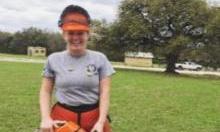Forestry Major, Mary Murdock, was excited to receive her welcome packet from AmeriCorps National Civilian Community Corps (AmeriCorps NCCC) in the Spring of 2017. It meant that she was chosen to be a member of a full-time, residential, team-based community service program for young adults, that would take her on a 10-month journey to strengthen communities across the country. Her chance to embark on this journey, however, was threatened because of her diagnosis of type 1 diabetes. After submitting her medical information to AmeriCorps NCCC, she was told that she could not be cleared to join the 2017 Class because her diagnosis was quite new, and they wanted her to show stability on insulin therapy for at least one year before she could be cleared. This would mean putting her life and aspirations on hold for almost a full year.
Mary did not think this was right. She was managing her diabetes exceptionally well and had not experienced any complications. Although she had only been living with diabetes for a few months when she applied, she knew intimately well what living with diabetes was like and how to manage it and thrive with it. Her dad has lived with type 1 diabetes for 45 years.
Upset about this setback, Mary contacted our Legal Advocacy Department to learn about her rights. A Legal Advocacy attorney explained to Mary that qualified individuals with diabetes have the right to participate in federal programs such as AmeriCorps NCCC under the Rehabilitation Act of 1973. Our attorney explained what the law requires of these programs in order to avoid discrimination and that excluding her on the basis of unwarranted fears or generalizations is illegal.
With assistance and support from our Legal Advocacy attorney, Mary went through an initial appeal to a Medical Board and a subsequent appeal of the Board’s denial, before she finally learned that she was cleared for service. Mary was grateful for the assistance she received from Legal Advocacy: “Thanks again for everything you have done for me along the way, this would not have even happened without your help and support.”
Mary recently shared with us what her service experience as an AmeriCorps NCCC member living with type 1 diabetes was like:
“The AmeriCorps pledge states:
I will get things done for America – to make our people safer, smarter, and healthier.
I will bring Americans together to strengthen our communities.
Faced with apathy, I will take action.
Faced with conflict, I will seek common ground.
Faced with adversity, I will persevere.
I will carry this commitment with me this year and beyond.
I am an AmeriCorps member, and I will get things done.
When I took this pledge, I felt very determined to show that I could make a difference in America, despite my diabetes.
I will get things done for America – to make our people safer, smarter, and healthier. I had the chance to serve five unique communities in my 10 months in AmeriCorps NCCC: the heart of Cherokee Nation, disaster relief in Houston, serving on a National Guard base, working in a school in Ferguson, and working at a botanical garden in rural Missouri. I had the chance to enter communities and help to create real change.
I will bring Americans together to strengthen our communities. I also felt I had the opportunity to educate and prove that people with diabetes can do whatever they put their minds to. While I faced challenges trying to juggle caring for my diabetes while moving every six weeks and doing tasks from running a chainsaw all day, to mucking and gutting houses, I also felt that I needed to prove myself and also give my best to the communities I had the chance to serve.
Faced with adversity I will persevere. AmeriCorps NCCC gave me the opportunity to help prove to myself that I can do whatever I put my mind to. I now am serving in a new way as a forester and, without my AmeriCorps journey, I do not think I would be the same person I am today. I am so glad I fought for my right to serve and had an amazing 10-month adventure, and the opportunity to continue to serve. I will carry this commitment with me this year and beyond. I am an AmeriCorps member and I will get things done.”
These are the personal experiences of individuals living with diabetes and does not constitute medical advice. Please consult with qualified health care professionals to meet your individual health and medical needs.









